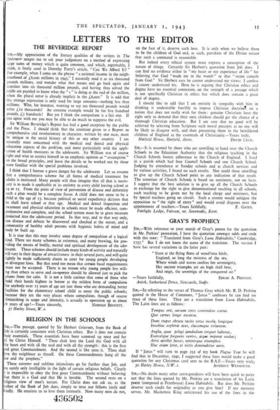THE BEVERIDGE REPORT
LETTERS TO
THE EDITOR
StR,—My appreciation of the literary qualities of the writers in The Spectator tempts me to ask your judgement on a method of expressing
large sums of money which is quite common, and which, regrettably, I think, is freely used in Dorothy Parry's article, " Can We Afford It? " For example, when I come on the phrase " a national income in the neigh bourhood of £6,000 millions in 1945," I naturally read it as six thousand pounds millions, and wonder what that means and go back again and translate into six thousand million pounds, and having thus solved the riddle am puzzled to know what the " s " is doing at the end of the million, when the plural sense is already implicit in the £6,00o." It is odd that this strange expression is only used for large amounts—nothing less than millions. Who, for instance, wanting to say ten thousand pounds would write £ro thousands? An extreme example would be for five hundred pounds, £5 hundreds! But yet I think the comparison is a fair one. If you agree with me you may be able to do much to suppress the evil.
Sir William Beveridge's Report has had a good reception by the public and the Press. I should think that the attention given to a Report so comprehensive and revolutionary in character, written by one man, must be unique in the social history of this or any other country I am naturally most concerned with the medical and dental and physical education aspects of the problem, and more particularly with the application of health measures to the adolescent. Sir William was of course right and wise to restrict himself to an emphatic opinion or " assumption " on the broad principles, and leave the details to be worked out by those more familiar with the special problems involved.
I think that I foresee a grave danger for the adolescent Let us assume that a comprehensive scheme for all forms of medical treatment for adults is instituted. Many people will thus imagine that all that is neces>ary is to made it applicable in its entirety to every child leaving school at 14 or 15. From the point of view of prevention of disease and deformity such a plan would be a complete fiasco. A child does not cease to be a child-at the age of 15, because political or social expediency dictates that he shall leave school at that age. Medical and dental inspection and treatment and physical education in schools must be made efficient, comprehensive and complete, and the school system must be in great measure projected into the adolescent period. In that way, and in that way only, can disease and defects be discovered and checked at the outset, and a community of healthy adult persons with hygienic habits of mind and body be built up.
It is true that this may involve some degree of compulsion of a logical kind. There are many schemes in existence, and many brewing, for providing the means of bodily, mental and spiritual development of the adolescent. These schemes should include many kinds of activity and naturally will vary in their degree of attractiveness in their several parts, and will quite rightly be made sufficiently elastic to cater for young people developing on divergent lines. But that need not mean that certain basal requirements must not be accepted. There is no reason why young people-less willmg than others to serve and co-operate should be allowed just to pick the plums from the cake. It is not a little curious that some of those who bold their hands highest in horror at the mildest form of compulsion for anybody over 15 years of age are just those who are demanding better facilities for the elementary school child to enter the public schools; because they are the very places where compulsion, though of course diminishing in scope and intensity, is actually in operation up to about






















 Previous page
Previous page